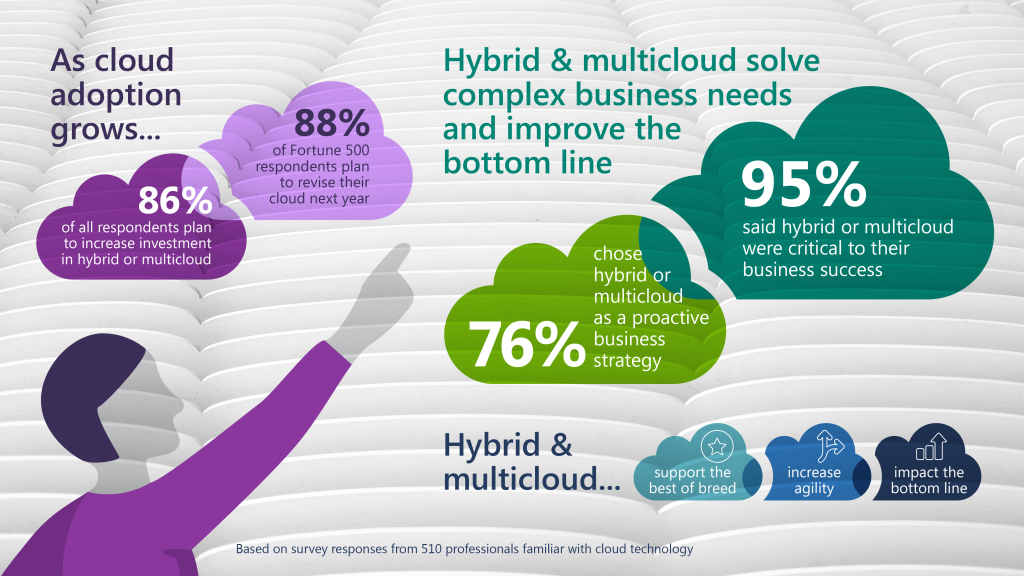
Across every industry and geography, companies are working hard to keep pace with evolving business needs and build on their existing digital investments. In my role leading the product team for the core of Azure, I spend a lot of time with customers learning what they need to be successful as they integrate cloud technologies into their business strategy to digitally transform.
As many have experienced firsthand, the pandemic has pushed more businesses to adopt wider use of cloud computing technology. A new survey finds it’s also driving more companies to deploy a hybrid (mix of on-premises and one or more public clouds) or multicloud (multiple public clouds) approach. The survey, conducted by The Harris Poll and sponsored by Microsoft, found 86% of all respondents plan to increase investment in hybrid or multicloud environments, and 95% say those technologies have already been critical to their success.
Results from the survey of business decisions makers, IT professionals and IT decision makers in medium to large U.S. companies demonstrate the opportunity in 2022 for cloud technology to solve complex business needs.
Hybrid and multicloud fuel business outcomes
The survey and our own observations both underscore how companies are emphasizing remote work, increasing demands for efficiency and ever-present competitive pressures to reduce costs. While the pandemic has already accelerated use of cloud technology, respondents shared they will continue to proactively and strategically invest in cloud, specifically hybrid and multicloud, in the next few years.
It comes down to the bottom line: these technologies are critical to business success, enabling new scenarios, improving resource efficiency and increasing business agility. Companies that use these technologies were more likely to report increases in revenue over the past 12 months, with 83% of those who operate in both hybrid cloud and multicloud environments reporting revenue growth compared to just 58% of non-hybrid and non-multicloud users. In fact, nearly all professionals in organizations that use hybrid or multicloud said these solutions drove direct business outcomes.
While some companies may arrive at hybrid or multicloud organically, the survey shows most organizations are choosing these technologies with strategic intent. Companies are deploying additional clouds for specific purposes, such as a cloud just for AI.
Flexibility and choice emerged as clear needs from businesses that aren’t just adopting a single cloud, but rather the right mix of clouds and the tools that go with them. Nearly all survey respondents agreed they need to be able to adopt cloud in some areas of business while retaining other business information on premises, primarily for regulatory reasons. Nearly nine in 10 say they will increase spending on hybrid or multicloud in the next three years.
Why? To address business demands including scalability, risk management and the ability to govern data and digital sovereignty. The majority of Fortune 500 business respondents say they’re likely to make changes to their cloud infrastructure in the next year, including half who plan to increase the number of cloud providers they are using.
Empowering customers with flexibility
We are committed to customers’ need for flexibility, which is why we built Azure to be hybrid by design and continue to invest in enabling the use of cloud-native technologies anywhere. As part of our ongoing investment, in 2019 we delivered Azure Arc – the foundation of our current approach to hybrid and multicloud. Azure Arc provides a centralized way for customers to manage, govern and secure their entire digital landscape across datacenters, edge and multiple clouds. We also encourage customers to choose familiar cloud-native tools or use Azure services to build and deploy their applications to on-premises, edge and multicloud environments. And that flexibility is resonating – with thousands of new customers signing up, including KPMG, Nokia, Royal Bank of Canada and Siemens Healthineers. In fact, 78% of the Fortune 500 companies now use Microsoft hybrid cloud offerings.
For example, worldwide telecommunications company Nokia uses Azure to serve customers and keep data secure and compliant in every geography where it operates. We worked with the Nokia team to develop an approach that gives it a standard way to deploy, operate and monitor its cloud-native applications in whichever environment customers choose, including Azure, AWS, Google Cloud Platform, private clouds or on-premises environments.
We also understand readiness and enablement are critical to customer success with hybrid and multicloud, and we continue to invest in this area. Today, we’re announcing the new Landing Zone Accelerator for Azure Arc-enabled servers, making deployments easier and faster with guidance and automated reference implementations based on our experience with thousands of customers.
As The Harris Poll survey underscored, recent years have challenged many enterprises to evolve their approach to cloud, including renewing their focus on hybrid and multicloud. At Microsoft, we expect this trend to continue and are committed to delivering the solutions customers need across the cloud environment continuum. We encourage you to learn more about how customers are using Azure Arc and our approach to hybrid and multicloud.




